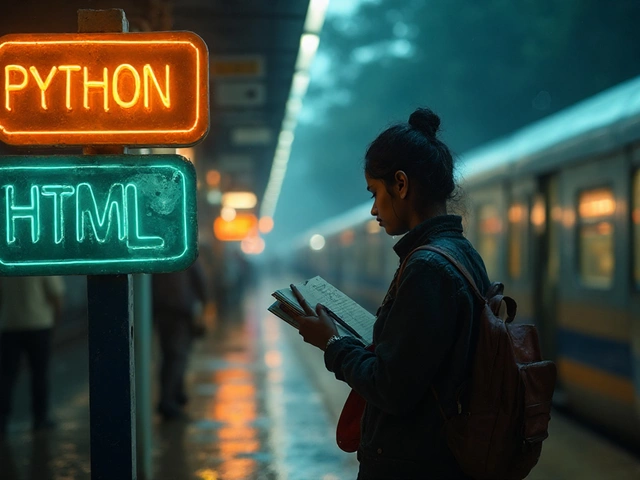When someone says, “IIT is harder to get into than Harvard,” it’s not just bragging. It’s about the crazy numbers and the wild grind you need to even stand a chance. Imagine nearly 1.5 million students fighting for less than 18,000 IIT spots every year. That’s not even 2% making the cut. Harvard’s acceptance rate hovers around 4%, which seems low—until you realize way fewer people even apply there in the first place.
But it’s not just a numbers game. The way you prepare is totally different. IIT JEE throws abstruse physics and math problems at you that are meant to trip you up. You have to solve these under extreme pressure, with most kids starting serious prep from class 9 or earlier. It’s like training for a marathon while solving a Rubik’s Cube... blindfolded.
- What Makes IIT JEE So Tough?
- Harvard Admission: Myths vs Reality
- Crunching the Numbers: Acceptance Rates
- Studying Styles: East vs West
- Tips to Beat the IIT JEE Stress
- Which Path Prepares You Better for Life?
What Makes IIT JEE So Tough?
The IIT JEE isn’t just another test; it’s a year-long battle that tests way more than just brains. This exam is notorious for its unpredictable questions and the speed at which you need to think. Most students who take the IIT JEE have already scored high marks in school, but still, less than 2% make it to an IIT. You could call it a survival game for some of India’s brightest minds.
Here’s why it stands out:
- Extensive Syllabus: The IIT JEE covers almost everything taught in classes 11 and 12, but the questions go much deeper. Memorization alone doesn’t help—application and problem solving is everything.
- Tricky Pattern: You’ll face questions designed to confuse, not just test memory. They combine two or three concepts in one, making you really think, not just recall formulas.
- Massive Competition: You’re not alone. Over 1.5 million students compete for just about 18,000 spots every year in all IITs combined. Getting through means being in the top 1% or better.
- Pressure Cooker Environment: The prep isn’t just about the brain. Stress hits hard. The two-year (sometimes three-year) grind leads to long hours, coaching, and, frankly, a lot of anxiety.
Take a look at the numbers:
| Year | No. of Applicants | Seats (All IITs) | Selection Rate (%) |
|---|---|---|---|
| 2022 | 1,600,000 | 16,598 | 1.04 |
| 2023 | 1,540,000 | 17,385 | 1.13 |
| 2024 | 1,510,000 | 17,740 | 1.17 |
There are no “legacy admissions” or big sports quotas here—just your rank against lakhs of others. That’s why clearing IIT JEE is seen as one of the toughest academic feats out there.
Harvard Admission: Myths vs Reality
When people picture getting into Harvard, they imagine it’s all about being a genius with perfect grades. Truth? That’s just part of the story. Harvard does have insanely high standards, but their selection process is way more than test scores and GPAs.
Here’s what trips up a lot of folks: Harvard’s admissions team looks for a full package—leadership, creativity, drive, sports, and community work. If you play violin at the state level, built an app, or started a fundraiser, that stands out as much as being a math whiz. And not everyone who applies is shooting for engineering or physics like at IIT; Harvard draws artists, writers, and athletes, too.
The numbers give a different vibe compared to IIT JEE. In 2024, over 56,000 students applied for Harvard’s undergrad class, and about 2,000 got in. That’s around 3.6% acceptance rate. Some people assume connections or money get you in, but that’s only a small slice. Most admitted students nailed their essays and interviews and showed something fresh or meaningful in their application. The process plays out over months, with lots of paperwork, recommendations, and essays, so it’s more drawn-out than the one-shot IIT JEE.
| Harvard Stat (2024) | Value |
|---|---|
| Applicants | 56,937 |
| Acceptance Rate | 3.6% |
| Average SAT Score | 1520 |
Bottom line: with Harvard, standing out is all about your story and personality, not just crushing standardized tests. Don’t get caught up thinking the road to Cambridge is a straight shot with high marks and nothing else.
Crunching the Numbers: Acceptance Rates
Let’s get real with the numbers, because this is where the whole IIT JEE vs Harvard debate heats up. Every year, about 1.5 million students register for the IIT JEE Main exam. Out of those, only around 180,000 qualify for JEE Advanced—the actual gateway to the IITs. Then things get even tighter. Roughly 18,000 grab seats at one of the 23 IIT campuses. That’s an acceptance rate sitting at around 1.2%.
Compare this with Harvard. Harvard gets about 56,000 undergrad applications a year and accepts around 1,900. That's an acceptance rate of roughly 3.4%. Sure, that’s a scary number too, but the odds still favor you about three times more than trying to crack into the IITs.
| Institution | Total Applicants | Accepted | Acceptance Rate |
|---|---|---|---|
| IITs (JEE) | 1,500,000 | 18,000 | 1.2% |
| Harvard | 56,000 | 1,900 | 3.4% |
Here’s the real kicker: almost all IIT JEE applicants are gunning for a seat with years of coaching under their belt. For Harvard, the pool is different—students with strong academics, extracurriculars, essays, and recommendations. They’re both tough, just in different ways.
If you’re prepping for IIT JEE, you're up against a massive population all trained for this one moment. Cracking IIT is like winning a national lottery where tickets cost sweat and sleepless nights, not dollars.

Studying Styles: East vs West
When it comes to IIT JEE prep versus aiming for Harvard, your whole routine looks different. In India, beating the IIT JEE often means long hours in coaching classes, solving pages of mock tests, and sticking to strict schedules for years. It’s common for students to study 6-8 hours daily outside of school, with the weekends reserved for marathon sessions. The goal is crystal clear: master tricky physics, chemistry, and math problems that are tougher than what’s taught in regular school.
In the US, students aiming for Harvard hardly ever face this single-focus grind. The system rewards a “holistic” profile. That includes good grades, but also strong SAT/ACT scores, sports, clubs, charity work, and leadership experiences. US students spend a lot of time building their resume, prepping essays, and looking for recommendation letters. Hours might be long, but the tasks are much more varied and offer creative ways to stand out.
Now, look at the table below to see how the two paths stack up:
| Factor | IIT JEE Candidates | Harvard Applicants |
|---|---|---|
| Main Focus | Math, Physics, Chemistry | Academics, Extracurriculars |
| Prep Timeline | 2-4 years of intense study | High school years with broad focus |
| Study Hours Per Week | 50-80 | Varies, but more spread out |
| Parental Involvement | Very high | Moderate |
One thing students often ask: can you mix the best of both worlds? Sure, but you’ve got to be practical. Mastering the IIT JEE needs laser focus and deep problem-solving skills, while Harvard wants to see you do a bit of everything. So if your goal is IIT, be prepared for more repetitive drills and fewer chances to explore. If your target is Harvard, widen your interests and show what makes you unique.
Tips to Beat the IIT JEE Stress
Stressing out over the IIT JEE is normal. The exam is famous for pushing students to their limits, but you don’t have to let anxiety rule your life. Here are some practical ways to handle the pressure and stay sane during your prep.
- Smart Study Plans: Don’t just clock in hours—plan what topics you’ll cover each week. Break the massive syllabus into chunks. Stick to your plan but tweak it if you’re falling behind. Weekly and daily targets keep it real instead of overwhelming.
- Practice, Don’t Cram: Regular practice with mock tests helps you avoid surprises on exam day. Don’t just memorize formulas—apply them to actual problems. JEE questions test how you think, not how much you can stuff into your head.
- Review Your Mistakes: After every test or problem set, spend time figuring out what went wrong. Keeping an error log really helps. Over time, you’ll spot patterns in your mistakes and crush those weak areas.
- Sleep Isn’t Optional: Pulling all-nighters is overrated. According to a 2023 survey by the Indian Sleep Society, students who get at least 7 hours of sleep score about 10% higher on average. Your brain needs downtime to lock in everything you’ve learned.
- Talk it Out: Don’t bottle up your worries. Talk to teachers, friends, or even seniors who’ve cleared the IIT JEE. Sometimes just venting about stress makes it lighter. Plus, you might get great hacks for studying smarter.
- Stay Active: You’re not just a brain on legs—your body needs attention. A 20-minute walk or quick sports break boosts your mood and focus.
If you want a sense of how these tips really pay off, check out this simple table:
| Habit | Percent of Top 500 Rankers Using It |
|---|---|
| Daily Practice Tests | 92% |
| Consistent Sleep Routine | 79% |
| Error Log Maintenance | 67% |
The process is grueling, but you’re not powerless. Use these strategies to dodge burnout and keep your IIT JEE journey under control.
Which Path Prepares You Better for Life?
There’s this ongoing debate: does IIT JEE or Harvard prep give you more real-world skills? It’s not as simple as handing out medals. Both grind you hard, but in different ways.
If you’ve slogged through IIT JEE prep, you’re no stranger to working under insane pressure. Time management, focus, discipline—these things get drilled into you. It’s so intense that handling university workload later might actually feel lighter by comparison. You learn to bounce back from setbacks because you’re used to high-stake failures. And the peer group? You’re surrounded by some of India’s brightest, so you end up picking up tips, shortcuts, and a hunger to improve that sticks for life.
Now, Harvard’s process is a bit different. Admission isn’t about just acing one brutal test. You need good grades, impressive extracurriculars, recommendation letters, and powerful essays. It’s about proving you’re well-rounded. So, you pick up communication skills, networking, leadership, and time-juggling—you have to. Students get opportunities for internships, research projects, starting clubs, and connecting with global experts. Plus, you’re exposed to a mix of cultures and ideas, which can totally change how you view problems and teamwork.
| Skill / Experience | IIT Path | Harvard Path |
|---|---|---|
| Problem-Solving | Super strong, especially technical | Well-rounded, with a creative twist |
| Communication | Gets better with time, but not a focus | Main focus, starting Day 1 |
| Networking | Strong local professional circles | Global, diverse connections |
| Leadership | Developed through projects & competitions | Baked into the curriculum & campus culture |
So, which is better? If you’re aiming for hardcore technical chops and unbreakable grit, the IIT JEE route has your back. If you want the soft skills, the network, and thinking outside the box, Harvard’s approach shines. Both put you through the wringer, but it’s the kind of challenges you face that shape what skills stick for life. Think about where you see yourself after college, and choose what matches your game plan.






Write a comment: